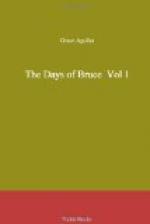“Bid him not mourn for Nigel,” he said; “bid him not waver from his glorious purpose, because so many of his loved and noble friends must fall—their blood is their country’s ransom; tell him, had I a hundred lives, I would have laid them down for him and for my country as gladly, as unhesitatingly as the one I now resign; and tell him, dearest, how I loved him to the last, how the recollection of his last farewell, his fervent blessing lingered with me to the end, giving me strength to strive for him and die, as becomes his brother; tell him I glory in my death—it has no shame, no terror, for it is for him and Scotland. Wilt thou remember all this, sweet love? wilt thou speak to him these words?”
“Trust me I will, all, all that thou hast said; they are written here,” placing her hand on her heart, “here, and they will not leave me, even if all else fail.”
“And thou wilt say to him, mine own, that Nigel besought his love, his tenderness for thee,” he continued, losing the enthusiasm of the patriot in the tenderness of the husband; “tell him I look to him in part to discharge the debt of love, of gratitude I owe to thee; to guard thee, cherish thee as his own child. Alas! alas! I speak as if thou must reach him, and yet, beset with danger, misery, as thou art, how may this be?”
“Fear not for me; it shall be, my husband. I will do thy bidding, I will seek my king,” she said, for when comfort failed for him, she sought to give it. “Hast forgotten Dermid’s words? He would be near me when I needed him, and he will be, my beloved, I doubt him not.”
“Could I but think so, could I but know that he would be near to shield thee, oh, life’s last care would be at an end, said Nigel, earnestly; and then for some time that silence, more eloquent, more fraught with feeling in such an hour than the most impassioned words, fell on them both. When again he spoke, it was on a yet more holy theme; the thoughts, the dreams of heaven, which from boyhood had been his, now found vent in words and tones, which thrilled to the inmost spirit of his listener, and lingered there, when all other sense had fled. He had lived in an era of darkness. Revelation in its doctrines belonged to the priests alone; faith and obedience demanded by the voice of man alone, were all permitted to the laity, and spirits like Nigel’s consequently formed a natural religion, in which they lived and breathed, hallowing the rites which they practised, giving scope and glory to their faith. He pictured the world, on whose threshold he now stood, pictured it, not with a bold unhallowed hand, but as the completion, the consummation of all those dim whisperings of joy, and hope, and wisdom, which had engrossed him below—the perfection of that beauty, that loveliness, in the material and immaterial, he had yearned for in vain on earth.




